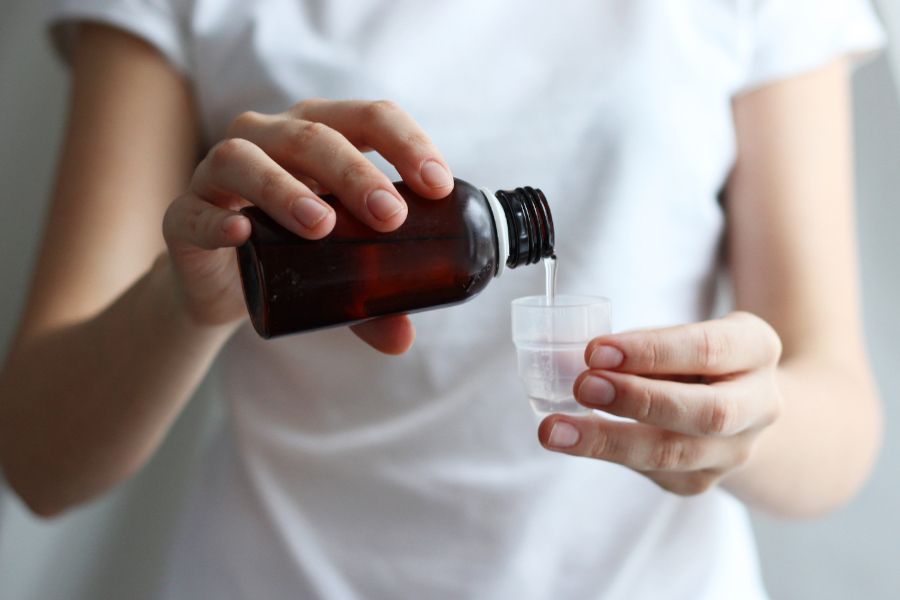Babies and medicines: What parents should pay attention to

The uncertain world of medications, dosages, and side effects can be confusing and overwhelming. In another article, we have already summarized which medications the medicine cabinet for babies should contain. You can find out what to pay particular attention to in connection with different medicines in this article.
Reading and Understanding Labels: The First and Most Important Step
Every medicine, whether prescription or over-the-counter, comes with a wealth of information on the label. It is absolutely essential to read and understand this information before giving the medication to your baby. The information on the label includes the active ingredient, dosage, possible side effects, instructions for use, storage instructions and much more. This is because there are certain labelling requirements for medicines in Germany that require the information mentioned and other information as information on the packaging.
It is important to note that some medications, although they may seem harmless, may contain ingredients that are harmful to babies. Some medications may contain alcohol or caffeine, for example, which are not suitable for infants. Therefore, you should always read the label carefully to make sure that all ingredients are safe for your baby. It is also crucial to understand the label to avoid accidental overdose. Many medications, especially those used to treat common conditions such as fever or cough, may contain the same active ingredient. Giving two drugs with the same active ingredient at the same time can lead to an overdose.
The correct dosage: A balancing act
When administering drugs to babies, dosage is one of the biggest challenges. Unlike adults, where the dosage is often standardized, the dosage for babies varies according to their weight, not their age. That's because weight is a more accurate indicator of how much of the drug is actually needed to be effective.
Measuring the dose correctly is another important aspect. It is absolutely necessary to use the dosing aid that is often supplied to measure the exact dose. Kitchen spoons and other everyday items, on the other hand, can vary widely in size and are therefore not reliable tools for measuring medications. A spoon that is too large could lead to an overdose, while a spoon that is too small could make the drug ineffective. It is therefore essential to always use the dosing aid provided by the manufacturer.
If you have any questions about dosage or are unsure how to measure the correct dose, don't hesitate to ask a healthcare professional for advice. It's always better to be safe than sorry when it comes to your baby's health.
Professional advice: an indispensable step
Doctors, pediatricians, and pharmacists are trained to provide qualified medical advice. They can answer specific questions about medications and provide helpful advice. If you're administering a medication you've never used before, you should always ask an expert for advice. The same applies if your baby has a new illness.
A doctor or pharmacist can also help you understand the information on the medication label and calculate the correct dosage. They can also inform you about possible side effects and tell you what signs to look out for that could indicate an overdose or an allergic reaction.
Pharmacists in particular are often underestimated sources of information when it comes to medicines. They have extensive knowledge of drugs, their interactions, and the best ways to administer them. They can also tell you what to do if your sweetheart misses a dose or if an overdose occurs. Don't forget to ask the pharmacist about the possible side effects of the drug. While many side effects are harmless and temporary, there are some that require immediate medical attention.
Shelf life and correct storage: a question of safety and effectiveness
The expiration date of a drug is more than just a number on the packaging. It is an indicator of how long the drug retains its effectiveness. After this date, the drug may be less effective or even change chemically, which can lead to unwanted side effects. It is therefore essential to check the expiration date before administering any medication to your sweetheart. Never use medications that have expired.
The correct storage of medicines is also crucial for their safety and effectiveness. Some medications need to be stored at certain temperatures to preserve their effectiveness. For example, some antibiotics should be stored in the refrigerator, while other medications should be stored at room temperature. It is important to follow the storage instructions on the medication label and act accordingly.
Choosing the Right Type of Medication: Liquid vs. Solid Form
Choosing the form of a medication you give your baby is crucial. Liquid medications are often the first choice for babies because they are easy to swallow and dose. They are easy to measure with the supplied syringe, spoon or pipette, allowing for precise dosing. In addition, liquid medications are absorbed more quickly and usually begin to work earlier than solid medications.
Solid medications, such as tablets or capsules, are usually not suitable for babies. This is true with the exception that they are old enough to swallow safely. For older children or young children, however, taking solid medications can be challenging. It is also more difficult to adjust the dosage of solid medications because they cannot always be easily divided.
The administration of drugs: strategies and techniques
Administering medication to babies can often be challenging. That's because babies tend to fight against taking medication. They are particularly happy to do this when medication has an unpleasant taste. However, there are several techniques you can use to make it easier to administer medication.
One of the most important points is that you should stay calm and patient. If you're stressed or anxious, your baby can sense it and will likely resist even more. Therefore, it is important that you stay relaxed and show your darling that he has no reason to be afraid.
One technique that often helps is to mix the drug with some liquid. Breast milk or infant formula, for example, are well suited. In young childhood, ice cream can also be a good choice, as it not only tastes good, but also numbs the taste buds a bit. This can help mask the taste of the medication and make it more comfortable for the baby. However, it is important to only do this if it is allowed by the manufacturer of the drug.
Awareness of side effects and hypersensitivity reactions
Observing your pet for side effects or allergic reactions to a medication is an indispensable part of medication administration. Some babies may be sensitive to certain medications, which can lead to side effects. It is important to watch for signs of such a reaction and seek medical help immediately if necessary.
Side effects can be varied, from mild symptoms such as mild rash, nausea or diarrhea to more serious symptoms. Difficulty breathing, high fever or persistent vomiting are warning signs and immediate reasons to see a doctor.
Home and natural remedies: an alternative or supplement
The use of home and natural remedies can be an alternative or supplement to conventional medicine. They can help relieve symptoms such as coughing, runny nose or mild digestive problems. Despite their benefits, it's important to always seek medical advice before using any home or natural remedy. Natural products can also have side effects or interact with medications.
Knowledge is Power: The Importance of Information
One of the most effective ways to safely administer medication to your baby is to gather information. Before administering a new medication, you should always inform yourself thoroughly about the medication. This includes information about proper dosing, possible side effects, storage requirements, and other specific instructions.
You can find most of this information on the package insert that comes with the medication. The package leaflet contains important information about the drug, including its use, dosage and possible side effects. If you have any questions or ambiguities, you should always consult a doctor or pharmacist
